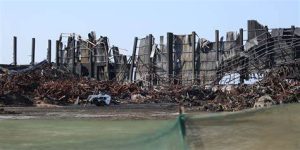
Staff Writer
Last week saw the release of the Airshed report, assessing environmental conditions, following the July 2021 fire, which caused the destruction of the United Phosphorus Limited chemical factory in Cornubia, KwaZulu Natal. The report found over 62 chemicals present in the air, during the blaze, the largest quotient’s being hydrogen cyanide, hydrochloric acid, and bromine. It concluded that air quality had largely returned to normal, but that chemicals may have seeped into the water system, especially since the chemicals had seeped into the Ohlanga River, killing fish, and continuing to impact the 7000 residents of Blackburn Village. It did argue that for the most part, health consequences had been minimal, but that in the long-term some of these consequences may be irreversible. UPL, the company involved, has accepted the report’s findings, but cautioned that it followed very conservative principles. In addition, the company continues to argue that it bears no responsibility, since the fire was started as a result of the unrest which had been occurring in South Africa at the time.
Speaking to Radio Islam International, Professor Rajen Naidu, from the University of KwaZulu Natal’s Department of Occupational and Environmental Health, labelled the report as interim. He argued that it would be difficult to fully quantify and measure the chemicals, since the extreme heat during the explosions and fire may have actually led to the formation of new chemicals: “Well, I don’t think we can say that the process has been concluded, but it has taken us quite a long time to get to the point where we are now, in which the technical people appointed by the company were able to provide us with the sort of, what I would call an interim report, which gives us a sense of the scale of the problem… we know that well over 700 chemicals were in that warehouse, and as a result of that, our people were exposed to a whole range of things.” He added, “It’s difficult to say exactly what people were exposed to, because in the process of the fire, chemicals would have been absorbed, chemicals would have been burnt up and your chemicals by-products would have been created as a result of the mixtures.”
Professor Rajen Naidu also noted that aerial and air quality damage from the fire would now likely be absent, but that the damage to agriculture, water and fishing may be long-term and difficult to quantify. Moreover, he also noted that long-term consequences may also be difficult to assess, especially since issues such as reproductive and chest problems, which may have been a consequence of the fire, may be attributed to other phenomenon, especially if an active effort is not made to assess such.
Lastly, Professor Naidu disagreed with UPL’s assertion that it bore no responsibility for the fire, arguing that proper processes and procedures were not followed during the construction of the factory, and in relation to the methods of chemical storage it relied upon. He said, “There’s no way that the company can escape Its total responsibility. [there] was a lot of laws that were transgressed or bypassed in the establishments of this high-risk enterprise in the middle of a residential area. It also seems as if that many of the precautions and safety procedures that ought to have been in place, were not in place.”







0 Comments